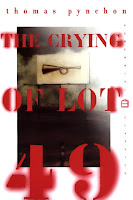 After numerous attempts, I have finally achieved what I once thought to be an impossible task: reading a Thomas Pynchon novel. Admittedly, his shortest and "most accessible", yet I still feel some pride at actually getting through it - and more than that, enjoying it. At first I tried reading it in small chunks, letting the page-long sentences wash over me without trying to figure out what was going on. Excruciating method that I do not recommend. Finally, this weekend I decided to read it for real, going back to the beginning, reading aloud the interminable sentences until I began at last to get into the rhythm of his writing. Once that happened, the book flowed along more easily and I began to catch glimpses of the elusive idea.
After numerous attempts, I have finally achieved what I once thought to be an impossible task: reading a Thomas Pynchon novel. Admittedly, his shortest and "most accessible", yet I still feel some pride at actually getting through it - and more than that, enjoying it. At first I tried reading it in small chunks, letting the page-long sentences wash over me without trying to figure out what was going on. Excruciating method that I do not recommend. Finally, this weekend I decided to read it for real, going back to the beginning, reading aloud the interminable sentences until I began at last to get into the rhythm of his writing. Once that happened, the book flowed along more easily and I began to catch glimpses of the elusive idea.
[Here's a sample of the long, involved sentences:Maybe to excess: how could he not, seeing people poorer than him come in, Negro, Mexican, cracker, a parade seven days a week, bringing the most godawful of trade-ins: motorized, metal extensions of themselves, of their families and what their whole lives must be like, out there so naked for anybody, a stranger like himself, to look at, frame cockeyed, rusty underneath, fender repainted in a shade just off enough to depress the value, if not Mucho himself, inside smelling hopelessly of children, supermarket booze, two sometimes three generations of cigarette smokers, or only of dust — and when the cars were swept out you had to look at the actual residue of these lives, and there was no way of telling what things had been truly refused (when so little he supposed came by that out of fear most of it had to be taken and kept) and what had simply (perhaps tragically) been lost: clipped coupons promising savings of 5 or 10¢, trading stamps, pink flyers advertising specials at the markets, butts, tooth-shy combs, help-wanted ads, Yellow Pages torn from the phone book, rags of old underwear or dresses that already were period costumes, for wiping your own breath of the inside of a windshield with so you could see whatever it was, a movie, a woman or car you coveted, a cop who might pull you over just for drill, all the bits and pieces uniformly, like a salad of despair, in a gray dressing of ash, condensed exhaust, dust, body wastes — it made him sick to look, but he had to look. (Pynchon, The Crying of Lot 49, 4-5)
Yes. That was all one sentence.]
I still cannot say that I got it. The entire experience was similar to what I imagine an acid trip to be like: nothing I can quite pinpoint but an overall, overwhelming sense of seeing an idea much larger than myself. The crux was a passage in which Oedipa (the protagonist) is trying to figure out whether the entire series of events were fabrication (an elaborate hoax or hallucination) or fact. She is certain that one or the other must be true since that is the matrix of life: ones or zeroes, life or death, paranoia or reality. And yet, since this is never resolved, one is left with the third possibility of something that is neither one nor the other — She had heard all about the excluded middles; they were bad shit, to be avoided...
4.20.2008
digital vs. analog
Subscribe to:
Post Comments (Atom)




2 comments:
ah yes, avoid that middle section. that could be a good motto for lots of things in life. :)
but i am minimizing what an amazingly well-written review you have here. wow krystal. i seriously think maybe you could get paid to write. ha! maybe you need to listen to your own advice? :)
AND--this long sentence (although i think when they are this long they really should be named something else, but i have no idea what--a word that hasn't been invented?) reminds me of faulkner and it makes me miss reading. i loved having to dig around in his prose and read and reread to figure out what was going on. something tells me my current life isn't going to allow reading like that anytime soon...
Oh yeah, I have an excuse too :) I always think that my writing style is only as good as the last thing I've read. I seem to be easily influenced. I do the same thing with accents when I'm traveling so I always figure it's not really authentically good writing. More a derivation of good writing...
Post a Comment